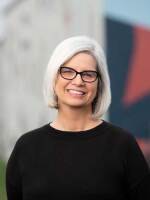AUGUSTA, Maine - Post traumatic stress disorder emerged as a diagnosis back in 1980. With all that's now known about PTSD, and about the difficulties facing veterans of Vietnam, Iraq and Afghanistan, Dr. Edward Tick says there's still a long way to go. Tick is an author, educator and psychotherapist from New York who has been treating veterans for 40 years. He was at the Togus VA Hospital in Augusta today, where he called for a new approach for dealing with PTSD.
For Dr. Tick, who still gets emotional when he discusses some of the veterans he's met over the years, PTSD could just easily be translated as Post-terror Soul Distress or Post-terror Social Disorder. It's a wound so broad and so deep that Tick says it cannot be healed through medical strategies alone.
He says that's evident from some of the stark statistics involving veterans of Iraq and Afghanistan. "We all know, I hope, 22 veterans a day are killing themselves," he says. "We've had over 6,000 combat deaths in Iraq and Afghanistan. We've already had over 30,000 suicides."
What's been recently overlooked, says Tick, are the tens of thousands of suicides and health struggles of Vietnam veterans. Of the 2.7 million men and women who served in that era, Tick says only about a third are still alive. He believes PTSD is as much a public societal disorder as it is a private psychological wound. And he does not think veterans should have to carry it alone. He's createda non-profit organization called "Soldier's Heart" to treat returning veterans holistically.
"A holistic view says the return journey is absolutely necessary, and needs as much, or more, tending and training and care-giving by everybody - by our health and military institutions and by the general community - than we do."
Soldier's Heart is a term first coined during the Civil War to describe the psychological effects of the war. That includes the complicated feelings of guilt, remorse, loss, pain and emotional detachment that accompany survival, as well as physical ailments.
"He described me to a 'T.' I didn't know him before, but everything he was talking about, either I've gone through it or I'm going through it," says Robert Curtis, of Rockland.
Curtis spent 22 years in the Army and served two tours in Vietnam, where he says he was exposed to Agent Orange and has recently been diagnosed with cancer. He says he's grateful for every day he wakes up in the morning. But he also understands that a lot of his contemporaries don't feel that way, and many of them aren't getting the help they need, despite plenty of good intentions from people in their communities.
"I mean, you can see that people are trying to get it right," Curtis says. "They talk about it. But they don't get it right."
"Knowing that they've gone through what they've gone through and taken personal life, I think it's something that will continue to evolve over time - and probably will never stop evolving in regards to how to treat veterans," says Michael Fournier, who joined the Army in 1995 and was deployed to Bosnia, where he served as a gunner for almost a year.
Like Curtis, Fournier says he supports Dr. Tick's more inclusive approach to treating veterans with PTSD. Among other things, Soldier's Heart calls for the creation of religious, educational and therapeutic programs for veterans, direct care for families, storytelling and restitution from the community.
"Which is the society saying to the veteran: 'You acted in my name, we are lifting the burden of grief and guilt off you and taking responsibility for your actions done in my name,' " Tick says.
Caring for veterans, says Tick, should mean sharing their burden.



